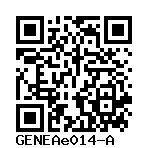GENEA029
GENEAe014-A
General
Donor Information
General Donor Information |
|
| Sex | female |
Phenotype and Disease related information (Donor) |
|
| Diseases | No disease was diagnosed.
|
External Databases (Donor) |
|
| BioSamples | SAMEA104012533 |
Ethics
| Was the embryo established purely for research purposes? | No |
| Have both parents consented to the use of the embryo for ESC derivation? | Yes |
| Has informed consent been obtained from the donor of the embryo/tissue from which the pluripotent stem cells have been derived? | Yes |
| Was the consent voluntarily given? | Yes |
| Alternatives to consent are available? | Yes |
| Alternatives to consent | IVF patients gave consent for investigations of clinically unsuitable embryos as part of their clinical cycle. This is a clinical process, independent of research. hESC were derived from embryonic outgrowth cells, originally developed for karyotyping, not from embryos and fully informed consent was granted. Multiple documents could not be added here so will send via email. |
| Alternative consent approval number | |
| Please indicate whether the data associated with the donated material has been pseudonymised or anonymised. | pseudonymised |
| Does consent explicitly allow the derivation of pluripotent stem cells? | Yes |
| * Does consent expressly prevent the derivation of pluripotent stem cells? | No |
| How may genetic information associated with the cell line be accessed? | |
| Will the donor expect to receive financial benefit, beyond reasonable expenses, in return for donating the biosample? | No |
| Has a favourable opinion been obtained from a research ethics committee, or other ethics review panel, in relation to the Research Protocol including the consent provisions? | Yes |
| Name of accrediting authority involved? | GeneaHREC |
| Approval number | meeting 13/9/2005 |
hESC Derivation
| Date of derivation | 2009-02-24 |
| Supernumerary embryos from IVF treatment? |
Yes
Separation of research and IVF treatment?
Yes |
| PGD Embryo? |
No |
Culture Conditions
| Medium |
Other medium:
Base medium: DMEM/F-12
Main protein source: Fetal bovine serum Serum concentration: 20 % Supplements
|
Characterisation
Analysis of Undifferentiated Cells
| Marker | Expressed | Immunostaining | RT-PCR | Flow Cytometry | Enzymatic Assay | Expression Profiles |
| NANOG |
Yes |
|||||
| POU5F1 (OCT-4) |
Yes |
|||||
| SSEA-4 |
Yes |
|||||
| TRA 1-60 |
Yes |
Teratoma positive, Alkaline Phosphatase stain positive.
Differentiation Potency
Genotyping
Karyotyping (Cell Line) |
|
| Has the cell line karyotype been analysed? |
Yes
46, XX no abnormalities detected
Passage number: 20
|
Other Genotyping (Cell Line) |
|


Login to share your feedback, experiences or results with the research community.